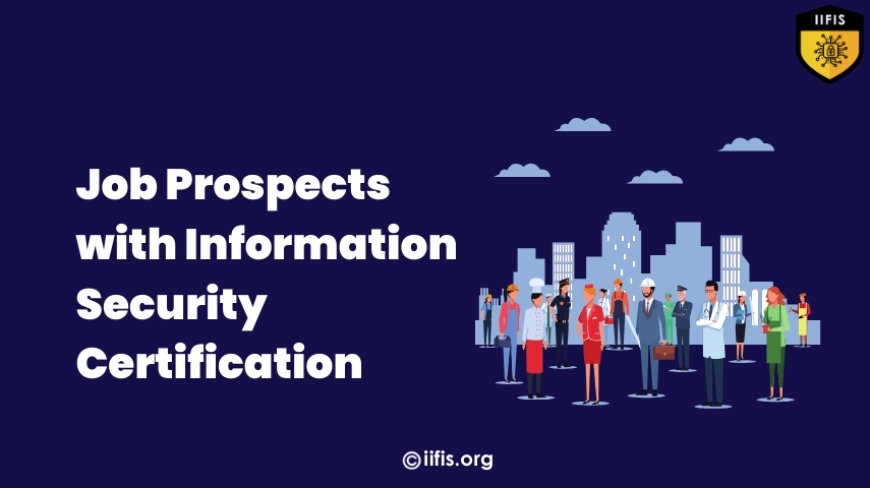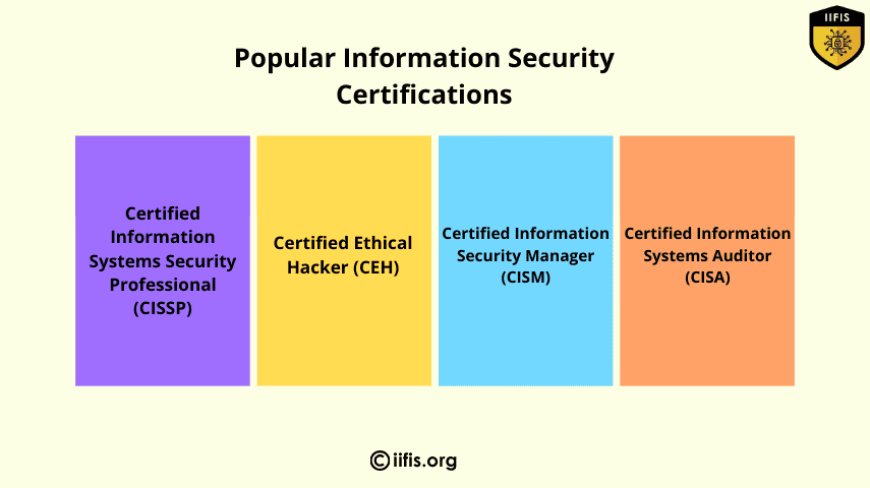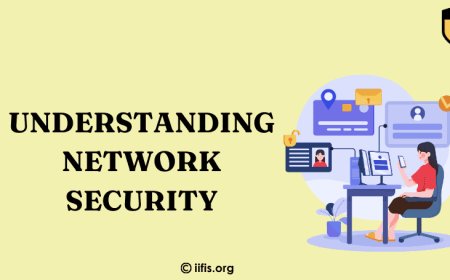Boost Job Prospects with Information Security Certification
Boost your job prospects with an Information Security certification. Learn how it can lead to better roles, higher salaries, and career growth in cybersecurity

Companies are looking for skilled professionals to protect their data and systems. Earning an Information Security certification can be a smart way to boost your job prospects and stand out in the job market. Whether you're just starting in IT or looking to specialize, certification shows employers that you have the knowledge and skills needed to handle security challenges. In this blog, we’ll explore how Information Security certification can open doors to new opportunities, build your technical expertise, and make you a valuable asset to any organization.
What is an Information Security Certification?
An information security certification is a professional credential that verifies an individual’s skills and knowledge in protecting data and managing security systems. These certifications are designed to show employers that a candidate has the technical expertise and understanding needed to address cybersecurity challenges effectively.
Certifications serve as proof of a candidate's ability to work in the field and their commitment to staying updated on security practices. They demonstrate that a person has met industry standards and can handle specific tasks related to securing networks, managing data protection, and preventing cyber threats.
Types of Information Security Certifications
Certifications come in different levels, suited to various experience levels:
-
Beginner-Level Certifications
These are ideal for those new to the field and cover foundational concepts. Examples include Certified Cybersecurity Technician (CCT), which introduce basics like network security, access control, and threat management. -
Intermediate-Level Certifications
These certifications are aimed at professionals with some experience who want to deepen their skills. Certifications like Certified Information Systems Auditor (CISA) and Certified Ethical Hacker (CEH) focus on skills like auditing security controls and ethical hacking practices. -
Advanced-Level Certifications
Advanced certifications are intended for experienced professionals looking to specialize. The Certified Information Systems Security Professional (CISSP) and Certified Information Security Manager (CISM) validate high-level knowledge in areas like information security governance, risk management, and advanced security operations.
Earning these certifications helps build a clear path for career growth in information security, allowing individuals to progress as they gain experience and expertise.
Why Information Security is a Growing Field
The rise in cyber threats and data breaches has made information security one of the most important fields in the digital age. From phishing scams to ransomware attacks, businesses face constant threats that can lead to financial loss, data leaks, and damaged reputations. This has highlighted the need for skilled professionals who can protect sensitive information and secure digital systems.
As a result, the demand for information security experts is expanding across all industries—from healthcare and finance to retail and government. According to the U.S. Bureau of Labor Statistics, jobs in cybersecurity are expected to grow by 35% from 2021 to 2031, which is much faster than the average for all other occupations. This demand offers strong job prospects and attractive salaries for those with the right skills and certifications, making information security a smart career choice with promising growth potential.
Benefits of Information Security Certification
-
Career Advancement
Information security certifications can open doors to new job opportunities, promotions, and higher salary potential. Employers often prefer certified candidates, as certifications indicate a strong understanding of cybersecurity principles and skills relevant to the role. -
Skills Validation
Earning a certification shows that you have a solid grasp of security principles, best practices, and industry standards. It validates your skills in areas such as threat management, risk assessment, and data protection, which can be a significant advantage in the hiring process. -
Industry Recognition
Many information security certifications are recognized globally, making them valuable credentials for roles in different industries and countries. Certifications like CISSP, CISM, and CEH are especially respected, helping professionals gain credibility in the cybersecurity field. -
Personal Growth
Pursuing certifications offers an opportunity to develop specialized skills, whether it’s ethical hacking, network security, or incident response. This focus not only strengthens technical abilities but also fosters confidence in handling real-world security challenges.
Overall, information security certifications provide valuable credentials that support career growth, validate expertise, and offer opportunities for skill development in a dynamic and essential field.
Popular Information Security Certifications

Here are some of the top information security certifications that professionals pursue to advance their careers:
-
Certified Information Systems Security Professional (CISSP):CISSP is a widely respected certification for professionals with a background in information security who are looking to deepen their expertise. It covers advanced topics like risk management, security architecture, and operations, making it ideal for those in mid-to-advanced-level roles.
-
Certified Ethical Hacker (CEH)
The CEH certification is geared towards individuals interested in offensive security and penetration testing. It teaches techniques used by hackers to uncover security weaknesses, allowing certified professionals to strengthen systems by identifying and fixing vulnerabilities. -
Certified Information Security Manager (CISM)
CISM is designed for individuals focused on the management aspects of information security. It’s best suited for professionals who oversee security policies and programs, offering skills in governance, risk management, and security strategy. -
Certified Information Systems Auditor (CISA):CISA is ideal for those working in auditing, control, and assurance roles. It provides knowledge on evaluating information systems, managing security controls, and ensuring compliance, making it valuable for auditors and security assessors.
These certifications are highly regarded in the cybersecurity field, each catering to different specialties and skill levels, and they can help professionals build a career path aligned with their interests and strengths.
How Information Security Certification Boosts Employability
-
Stand Out in a Competitive Job Market:
Certifications show employers that candidates have specialized skills and current knowledge, making them more attractive in a crowded field of applicants. -
Higher Pay and Better Positions:
Certified professionals often qualify for higher salaries and advanced roles, as many companies reward certifications with premium pay and promotion opportunities. -
Networking Opportunities:
Certification organizations host events, webinars, and forums, allowing certified individuals to connect with peers, mentors, and industry leaders, which can help in career growth and job opportunities.
Key Skills Gained Through Information Security Certification
-
Risk Management and Assessment
Certifications teach professionals to identify, evaluate, and manage security risks. This skill is crucial in any sector, as organizations need to protect sensitive data and minimize potential threats, whether they’re in finance, healthcare, or government. -
Network Security Principles
Understanding network security is fundamental in information security. Certified professionals learn to secure networks, set up firewalls, and monitor network traffic to prevent unauthorized access. Network security is critical in sectors like banking and government, where data protection is a priority. -
Incident Detection and Response
Certifications provide skills to detect security incidents and respond effectively. This involves recognizing suspicious activity, containing threats, and restoring systems. Quick response is essential across all industries to minimize damage and maintain trust. -
Security Policy Development and Compliance
Professionals learn to create security policies and ensure that systems comply with legal and industry standards. This skill is especially important in regulated sectors, such as healthcare and finance, where data privacy and compliance are mandatory.
These skills are applicable across various industries, equipping professionals to handle security needs in a wide range of environments, from protecting patient data in healthcare to securing financial transactions in banking.
Preparing for an Information Security Certification
-
Choosing the Right Certification
Select a certification that matches your career goals and skill level. For beginners, entry-level certifications like are ideal, while experienced professionals might pursue CISSP or CISM. Think about where you want to work—certain certifications may be preferred in specific industries or roles. -
Study Resources
Use a mix of resources to prepare, such as recommended books, online courses, and practice exams. Bootcamps offer intensive training and are helpful for focused study. Practice exams can help gauge readiness, while books and courses provide in-depth knowledge. -
Importance of Hands-On Labs and Real-World Simulations
Hands-on labs and simulations are essential for building practical skills. Many certifications, like CEH, emphasize labs that mimic real-world security challenges, allowing you to apply what you’ve learned in a controlled environment.
Career Paths with Information Security Certification
Certifications can open doors to many cybersecurity roles across industries. Here are some popular career paths:
-
Security Analyst: Monitors and secures networks, analyzing threats to keep systems safe.
-
Cybersecurity Consultant: Advises companies on security strategies and best practices.
-
Penetration Tester: Simulates attacks to test a system’s defenses and find vulnerabilities.
-
Information Security Manager: Oversees security policies and programs to protect company data.
-
Chief Information Security Officer (CISO): Leads a company’s overall security strategy and manages high-level risk.
These roles are found across various sectors, including tech, finance, healthcare, and government. Certifications help professionals meet the demands of these positions and build a career in the growing field of information security.
Final Tips for Success in Information Security
-
Commit to Continuous Learning
Cybersecurity is constantly evolving, with new threats and solutions emerging regularly. Staying updated through courses, webinars, and security blogs helps professionals maintain their skills and adapt to changes. -
Engage with the Cybersecurity Community
Participating in cybersecurity forums, local meetups, and industry events can connect you with peers, mentors, and experts. Platforms like Reddit, LinkedIn groups, and specialized forums allow for knowledge sharing and networking, which can be beneficial for job leads and skill development. -
Gain Practical Experience
Hands-on experience is key to applying certification knowledge in real-world scenarios. Work on real projects, join cybersecurity competitions, or use labs and simulations to build practical skills. Practical knowledge combined with certification strengthens your expertise and makes you a more well-rounded candidate.
Obtaining an information security certification offers numerous benefits, from improving job prospects to enhancing career growth. Certification not only validates your skills and knowledge but also sets you apart in a competitive field, making you a valuable asset to employers. Many certified professionals experience higher salaries and greater opportunities for career advancement, as certification signals expertise and commitment to staying current in the field.
If you’re ready to take your information security career to the next level, consider starting with a certification that aligns with your goals. Taking the first step towards certification with a respected institution like the International Institute of Information Security (IIFIS) can provide structured learning and practical skills to strengthen your expertise. Investing in your certification is an investment in your future, positioning you for a successful and rewarding career in information security.
























